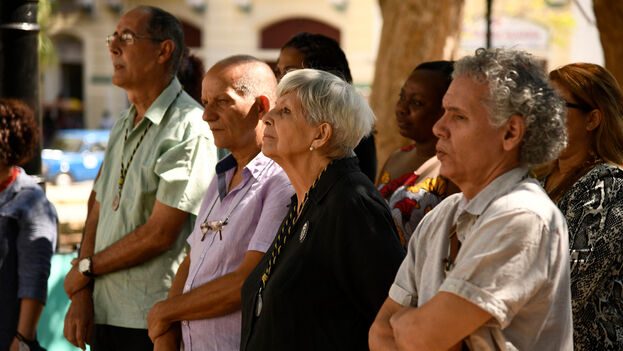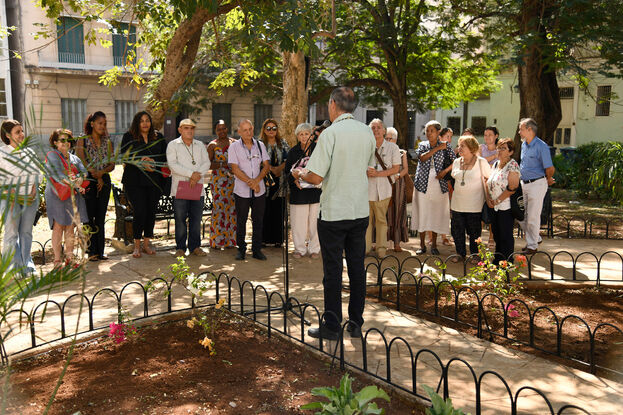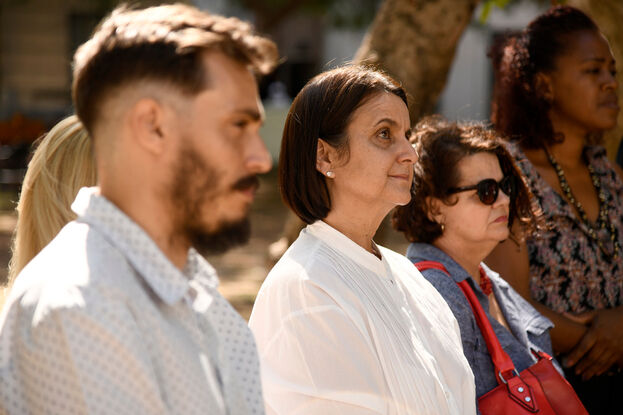
![]() Xavier Carbonell, Salamanca, 15 May 2023 – On 20 June 2022, the Cuban Language Academy (ACuL) sent out a laconic message: the poet Roberto Méndez, who should have led the institution until 2026, gave up his post “for health reasons”. His successor would be the essayist Jorge Fornet, the then vice-director and one of the confidantes of the regime in Casa de las Americas. The change was unexpected and, looking for an explanation, 14ymedio contacted Méndez. The writer never replied.
Xavier Carbonell, Salamanca, 15 May 2023 – On 20 June 2022, the Cuban Language Academy (ACuL) sent out a laconic message: the poet Roberto Méndez, who should have led the institution until 2026, gave up his post “for health reasons”. His successor would be the essayist Jorge Fornet, the then vice-director and one of the confidantes of the regime in Casa de las Americas. The change was unexpected and, looking for an explanation, 14ymedio contacted Méndez. The writer never replied.
Nevertheless, another member of the Academy, interviewed under condition of anonymity, explained to this newspaper why Méndez was relieved of his duties, what tensions the institution had been living under in recent months, and how it had been hijacked by the government.
The crisis of power began in May 2022, when Daniel Ortega put before his parliament the closure of the Nicaraguan Academy of Languages, “sister” to the Cuban one. This measure put the Havana academics ‘in check’: either they condemned them – as many organisations and intellectuals were doing – or they stayed silent, showing a lack of autonomy and a complicity with Ortega, an ally of the Cuban regime.
“Contrary to all predictions, Méndez decided to sign a document of solidarity with the Nicaraguan academics”, says the member of the Academy interviewed by 14ymedio. In addition, the writer supported an announcement by the Spanish Royal Academy (RAE) which expressed its “deep concerns” with Ortega’s action and vindicated “the freedom of thought, expression and association” in the country.

“Méndez’s letter was not widely seen nor disseminated”, says this newspaper’s source inside the Academy. “The publishing of the document was not down to a personal decision: it was something agreed by the five members of the government Junta. The plenary session was not affiliated with this business”.
He had only been director of the Academy for four months.
When Roberto Méndez began as director of the Academy on 18 February 2022, the Communist Party’s newspaper welcomed his being chosen for the post and said that everything remained “in good hands”. However, the official press has kept silent since his resignation and didn’t announce that Jorge Fornet had taken over the role in January.
After months in limbo, the Academy attempted to return to its normal functioning. Fornet, who worked for years as right hand man to the cultural coordinator Roberto Fernández Retamar, was finally presented as leader of the Academy at the ninth International Congress of the Spanish Language in Cádiz, Spain, in March.
“There are some leaders that are awarded their role like it were a prize, but there are other cases in which it looks more like they’ve been bought. That is the case with Fornet”, thinks the Academy member interviewed by this journal.
Despite his loyalty at Casa de las Americas, Fornet’s trajectory has not been irreproachable in the eyes of the regime. Author of numerous essays about the cultural politics of the Revolution, and son of the similarly “problematic” writer Ambrosio Fornet, the essayist is remembered for a volume that was never sold in Cuban bookshops: The 71: Anatomy of a Crisis, a formidable analysis written in the year in which the poet Heberto Padilla was arrested by the State Security.
“The appointment of Fornet is an attempt to “cleanse” him once and for all, of all of his lacking in orthodoxy. The government wants to set him on the right road, that’s why he was offered the job. And it looks like it’s getting results”, says the Academy source.
The “voluntary” defenestration of Roberto Méndez and the ascent of Fornet had, besides, a higher objective: to gain a definitive control over the ACuL, an institution which defended to the hilt its autonomy throughout the Republic and which Fidel Castro, from 1959 onwards, tried in vain to dismantle.
“As the Revolution failed to eliminate the Academy, it decided to infiltrate it” – just like it did with the masons and many other institutions – explains the interviewee. The ACuL’s resistance to Castro, with with Dulce María Loynaz as leader, is legendary.

Méndez himself related, in a published article, how when he was a young man and recently arrived in Havana, the corporation [Academy] seemed to him like an anachronism compared with the institutions created by the Revolution. It was a “strange mixture of retired professors and ruined nobles”, all brought together in Loynaz’s large house, in Calles 19 and E in El Vedado, which functioned as one of the bases of the institution.
With the passage of time, and in the face of the extreme age of the writer [Loynaz], the Academy was regulated by intellectuals affiliated to the government and agents of counterintelligence, who infiltrated the corporation little by little: Lisandro Otero, Salvador Bueno, Roberto Fernández Retamar and Nancy Morejón. In 2012, after decades of suffocation by the regime, the ACuL was absorbed into the Historians’ Office, at that time led by Eusebio Leal. Under Leal’s patronage, the corporation began its definitive relocation to the San Gerónimo school building in Old Havana.
“The key to understanding how the Academy functions today is to observe the essayist Graziella Pogolotti, a figure who has received very little attention but who is the person that dictates the government instructions to the corporation”, says our interviewee. “The decisions that Graziella implements, with help from Professor Luisa Campuzano, are those which the Ministry of Culture have taken.
It was Pogolotti (she who also had links to the State Security) who, according to our source, arranged the dismissal of Rogelio Rodríguez Coronel, director of the ACuL up until 2022, and his substitution by a “malleable” candidate like Roberto Méndez.
“Bearing in mind the Academy’s team, Méndez was announced as the ideal director” said the source. “No one was going to choose a novelist like Leonardo Padura, who joined the corporation in 2019. Nor a writer like Mirta Yáñez, who has never meddled in problems. The same goes for less ‘noisy’ academics like the linguist Sergio Valdés Bernal or the historian Eduardo Torres Cuevas. The ‘old camajanes‘ [rough translation: lazy old parasites] of Cuban literature, like Antón Arrufat or Reynaldo González, would never have accepted the role”.
Méndez didn’t have any qualms in accepting Graziella Pogliotti’s idea, says the source. “Everyone else said no”, he insists.
It is very revealing that the condemnation of Daniel Ortega, aside from its limited repercussions, didn’t lead to the expulsion of Méndez from the ACuL, the academic observes. “The regime itself also has an image of cordiality to maintain in front of the Association of Spanish Language Academies (Asale) and the RAE”. Havana won’t dare to repeat Managua’s [Nicaragua] action.
Regarding Jorge Fornet, he remains under surveillance and is “still disposed to be bought”, he concludes. Meanwhile, the essayist continues to lead the Academy and continues to try and establish a working rhythm there, amongst all the crises and divisions.
The small turnout of the Academy’s members on 21 April at the traditional tribute to Miguel de Cervantes on the Day of Languages, in San Juan de Dios Park, was very telling. Watched closely by Perla Rosales, the implacable deputy director of the Historians’ Office – and their supreme leader in practice – the Academy knew how to disguise their definitive hijacking by the regime, with smiles and bouquets of flowers.
Translated by Ricardo Recluso
____________
COLLABORATE WITH OUR WORK: The 14ymedio team is committed to practicing serious journalism that reflects Cuba’s reality in all its depth. Thank you for joining us on this long journey. We invite you to continue supporting us by becoming a member of 14ymedio now. Together we can continue transforming journalism in Cuba.
